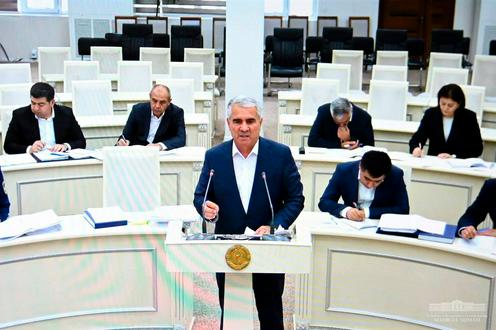Regional governors, city and district administrators, and sectoral leaders in Uzbekistan’s Bukhara Region will adopt an emergency work regime for six months. The decision follows a critical review of the region's efforts in attracting investments, reducing poverty, and tackling unemployment, according to the presidential press service.
During a November 29 meeting, President Shavkat Mirziyoyev expressed dissatisfaction with the region's economic performance, emphasizing that its results fall short of its potential.
Under the new regime, authorities plan to implement 70 flagship projects modeled on successful initiatives in Saykhunabad, Uychi, Zarbdar, and Gijduvon. These efforts aim to generate income for 150,000 people and lift 40,000 residents out of poverty.
The strategy includes industry-specific specialization for various districts. For example:
Peshku and Shafirkan will focus on construction materials and textiles.
Kagan City, Alat, and Jondor Districts will emphasize food production.
Gijduvon and Romitan will prioritize chemical industries.
This plan envisions $150 million in projects, the establishment of 411 small enterprises, and the creation of 12,000 jobs.
Four new textile factories worth $320 million will double the region’s production capacity and create 5,000 additional jobs.
Tourism development is also a priority, with a goal of welcoming 2.2 million foreign visitors in 2025 and increasing export revenue from tourism to $600 million. Plans include the construction of 69 new hotels and the opening of 2,000 craft shops and boutiques.
In agriculture, an additional 20,000 hectares of land will be cultivated, expected to yield 100,000 tons of produce and provide employment for 2,000 people. Pistachio cultivation is planned on unused pasturelands.
Overall, Bukhara Region aims to launch 106 projects in 2025, leveraging $2 billion in foreign investments to create 105,000 permanent jobs and increase exports by $350 million.
ℹ️ Historically, the region's economy has been heavily reliant on agriculture, according to the presidential press service. Over the past seven years—following a change in national leadership—Bukhara has attracted over $4 billion in investments, driving growth in sectors such as energy, electrical engineering, chemicals, pharmaceuticals, and textile and leather production. Since early 2024, 1.5 million foreign tourists have visited the region.










